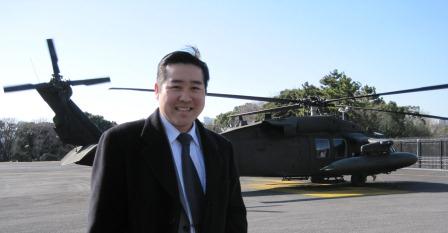First-year political science professor, Dr. Nori Katagiri, represents many of the characteristics that he says are pronounced traits in his native Japan: He is humble, polite, devoted, works hard and he has sacrificed.
While students can see these traits, particularly his humbleness and devotion to international security, shine through as Katagiri conducts his “Introduction to International Politics” course, Katagiri’s sacrifice happened years ago when he came to the United States after high school with the desire to be different.
“I grew up like a normal Japanese child, and nothing really special happened until I realized I wanted to change the course of my life,” said Katagiri. “Most Japanese children go on a very similar path of looking to get into good universities and get a good job in Japan. I wanted to be different. So I started studying English, world history, social sciences and I decided to ask for my parents understanding to come to the U.S.”
Once Katagiri arrived in the U.S., he plunged into the world of academia, earning his B.A. from the University of South Carolina, a Master of International Affairs from Columbia University and a Ph.D. in political science from the University of Pennsylvania.
“Columbia was the place where I realized I wanted to study international security issues. Not just international relations, but also international security,” said Katagiri. “I really benefitted from working and studying with good professors there.”
Katagiri says his interest in the field lies in the fact there are still so many questions that haven’t been answered, particularly about terrorism, a topic in which he has not only researched, but experienced.
“When I was in graduate school, that was when the unfortunate events of 9/11 took place in New York where I was located at that time,” Katagiri said. “There are many puzzles about why, for example, terrorism happens the way it does.”
Indeed, terrorism continues to be a puzzle and salient issue that affects nations and peoples around the world, noted most recently by the attacks in Paris and Beirut, Lebanon.
While these attacks are devastating, Katagiri finds them as motivation to continue his research.
“I was motivated to be part of the academic community within the United States to make contributions to research and teaching about social and political issues like that,” said Katagiri.
“Even now, with the tragedy in Paris and other places, there are still many questions that we should be striving [to find] answers to.”
After receiving his Ph.D., Katagiri found himself somewhere he didn’t completely expect: the Air War College at the Maxwell Air Force Base in Montgomery, Alabama. The Air War College is a joint military graduate school for senior officers and officials of the U.S. government and international officers at the base.
“When I was on the job market, the Air Force was particularly interested in people doing international security … I think the Air Force is also interested in working on the role of air power in countering insurgency situations like that. That’s how I think they found me and my work somehow interesting,” said Katagiri about his start at the War College.
Katagiri spent five years of federal service at the base, teaching East Asia and North East Asia politics to colonels, lieutenant colonels, Navy captains and commanders, which he admits is very different compared to teaching civilian, undergraduate students.
“When I joined the air force, all of a sudden the student population changed to 40-45 years-old … who have nearly two decades of experience, combat staff and support, intelligence, various functions, they have a lot of confidence.”
He continued: “those officers who get to go to war colleges like that are very promising figures who made a lot of sacrifice to the nation, to their family, and who are going to be very successful.”
While Katagiri is currently teaching at a civilian university, where the stakes are arguably much lower, he believes that teaching this information to college students is still very important.
Katagiri explained that in this age of globalization, it is critical to learn about nations and cultures outside of the U.S. border, saying: “Making sure that people in the United States have maximum opportunities to learn from foreign cultures, foreign studies [that] is something that we should be doing. There are just so many things that we can take advantage of and that’s why I think it’s important for us to study things like that.”






